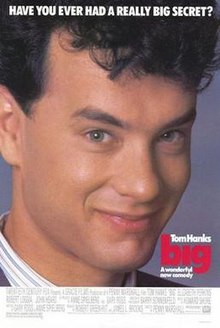One of the first comedies about body-swapping and identity-switching, Big is a charming film, boasting a career-making performance from Tom Hanks (even though the role was not intended for him).
Grade: B+ (**** out of *****)
| Big | |
|---|---|

Theatrical release poster
|
|
The Italian film “Da grande” (1987) served as inspiration for Big, which Gary Ross and Anne Spielberg developed quickly, selling it to James L. Brooks and 20th Century Fox.
Anne’s brother, Steven Spielberg, was attached to direct and wanted to cast Harrison Ford as Josh but he dropped out due to scheduling conflicts with Empire of the Sun (1987); Ford also pursued other projects instead. Spielberg would later say that he did not to take any credit away from his sister.
Kevin Costner, Steve Guttenberg, Warren Beatty, Dennis Quaid, Matthew Modine were offered the role of Josh, but all turned it down.
The comedy and Penny Marshall (formerly TV actress), catapulted Hanks to the major league of stars after working for nearly a decade in minor comedies.
The tale’s nominal hero is Josh (David Moscow), a 13-year-old boy from New Jersey, who can’t wait to mature—to be “big.”
It’s the kind of universal wish that many boys his age experience, a result of frustrations caused by social restrictions, not to mention hormonal conditioning.
Josh declares his fantasy at an amusement pier fortunetelling machine. Lo and behold, his wish comes true. The next morning, Josh wakes up-only to discover that he’s grown to manhood overnight!
Now played by Tom Hanks, he still is a 13-year-old mentally and emotionally, and he decides to hide out in New York City until he can figure out what to do next.
Josh lucks into a job with a major toy company run by McMillan (Robert Loggia). By cannily bringing a child’s eye view to McMillan’s business, Josh rises to the top. In the process, he falls in love with fellow employee at the toy store, Susan (Elizabeth Perkins). But he’s still a kid, and he’d like to go back to his own world and own body.
The movie contains many amusing scenes, one of which depicts Loggia and hanks tap-dancing to “Heart and Soul,” on a huge keyboard in F.A.O. Schwartz.
The critical acclaim and commercial popularity of “Big” led to another collaboration between director Penny Marshall and Hanks, “A League of Their Own.”
Production values are excellent, especially cinematography Barry Sonenfeld, who went on to become a director with “The Addams Family.”
The movie was hugely popular, earning $152.0 million at the box-office, against a production budget of $8.0 million.
When the text was turned into a Broadway musical, it failed.
Due to its inventive writing and light direction, “Big” overcame the problems of many other high-concept comedies.
It may or may not be a coincidence that within a year, two other similarly-themed movies were released: “All of Me” with Steve Martin and Lily Tomlin, “Like father, Like Son,” starring Dudley Moore, and “Vice Versa” with Judge Reinhold. The first movie to use this concept might have been “Freaky Friday,” with Barbara Harris and Jodie Foster, back in 1977.
My Oscar Book
Oscar Nominations: 2
Screenplay (Original): Gary Ross and Anne Spielberg
Actor: Tom Hanks
Oscar Awards: None
Oscar Context:
The winners of the Original Screenplay Oscar were Ron Bass and Barry Morrow for Barry Levinson’s “Rain Man,” which swept most of the major Oscars, including second Best Actor Oscar for Dustin Hoffman; the first was for “Kramer Vs. Kramer.”
Credits:
Directed by Penny Marshall
Written by Gary Ross, Anne Spielberg
Produced by James L. Brooks, Robert Greenhut
Cinematography Barry Sonnenfeld
Edited by Barry Malkin
Music by Howard Shore
Production company: Gracie Films
Distributed by 20th Century Fox
Release date: June 3, 1988
Running time: 104 minutes (theatrical); 130 minutes (extended edition)
Budget $18 million
Box office $151.7 million











